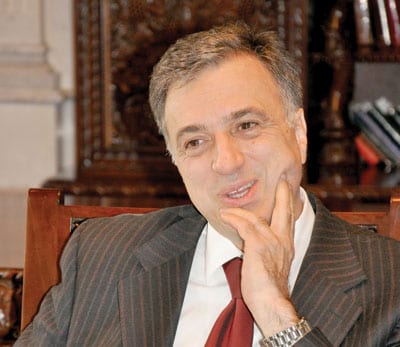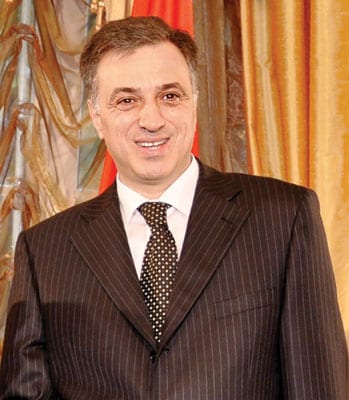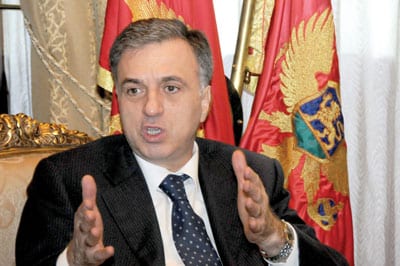The past decade was marked by the strong progress of Montenegro on its path towards the European Union, based on the foreign policy orientation of Montenegro and its commitment to European and Euro-Atlantic integration
On this path, Montenegro has opened 22 negotiating chapters and closed two. Relations between Serbia and Montenegro are improving, but there are still open bilateral issues that should be resolved as soon as possible, in order for the two countries to be able to speed up the process of EU accession and contribute to the further stabilisation of relations in the region.
Montenegro recently celebrated the tenth anniversary of its declaration of independence. How did you experience this date?
I’ve always had ambiguous feelings about the restoration of Montenegro’s statehood: as the fulfilment of the debt to the past in which Montenegro was an internationally recognised state, and as a chance to promote its best interests for the benefit of all citizens of Montenegro by exercising its full sovereignty within the international community.
 In Montenegro, there is a thousand-year state tradition and respect towards the international recognition of the country since the reign of the last ruler of the Petrović dynasty, Duke and King Nikola. There was also a pragmatic need to promote, through our state, the values of Montenegro in the international community and provide a better quality of life for all of our citizens.
In Montenegro, there is a thousand-year state tradition and respect towards the international recognition of the country since the reign of the last ruler of the Petrović dynasty, Duke and King Nikola. There was also a pragmatic need to promote, through our state, the values of Montenegro in the international community and provide a better quality of life for all of our citizens.
When you look at the ten-year balance, you must note the integration success, but also valuable economic achievements. Montenegro is in the process of ratifying its NATO membership but has also opened 22 chapters on membership negotiations in the EU and has closed two of them before the deadline. There has been growth in the gross domestic product of 70 per cent, employment has increased by 9.8%, the average salary is up 70 per cent and pensions are 100 per cent higher.
Development in relation to the EU has been increased from 30 to 43 per cent. Of course, we wanted better and higher, and we admit that Montenegro has its economic and social problems, and therefore serious challenges and responsibilities in the future. But it must be acknowledged that in the past decade we secured valuable integration and development success.
In Montenegro there is a thousand-year state tradition and respect towards the international recognition of the country since the reign of the last ruler of the Petrović dynasty, Duke and King Nikola
Do you agree with the evaluation of the Prime Minister of Montenegro – outlined at the celebration of the jubilee – that it was only in 2006 that Montenegro remedied the injustice caused in 1918 when it became part of the Kingdom of Yugoslavia and restored national dignity and pride?
I absolutely agree with this assessment, and it is the testimony of the experience of Montenegro, which managed to correct the historical injustice of the loss of the state by restoring independence. In the anti-fascist movement, Montenegro launched a renewal of its unjustly lost statehood and was given the status of a republic in the former common state, only to become sovereign and internationally recognised after the May referendum in 2006. This fulfilled the obligation to respect our history because the loss of the state bore the brunt of great injustice and its restoration brought back national dignity.
May saw the signing of the Protocol on the Accession of Montenegro to NATO and so far it has been ratified by Iceland, Slovenia, Hungary and Slovakia. How do you see that process?
As the finale of the very complex and demanding process of Euro-Atlantic integration, which represents great recognition for Montenegro’s success in attaining NATO standards. In just one month, the Accession Protocol has been ratified by the parliaments of four NATO member states, which also refers to the expectation of good pace of membership ratification.
 Euro-Atlantic integration is proclaimed as our integration preference in the Constitution of Montenegro and in the Declaration of an independent Republic of Montenegro from 3rd June 2006, and based on the need for permanent security, economic and political benefits and the acceleration of European integration. Of the 28 EU member states, 22 are members of NATO, nine out of every ten EU citizens live in NATO states, so it is natural that membership in NATO means additional encouragement to EU membership.
Euro-Atlantic integration is proclaimed as our integration preference in the Constitution of Montenegro and in the Declaration of an independent Republic of Montenegro from 3rd June 2006, and based on the need for permanent security, economic and political benefits and the acceleration of European integration. Of the 28 EU member states, 22 are members of NATO, nine out of every ten EU citizens live in NATO states, so it is natural that membership in NATO means additional encouragement to EU membership.
Three of the four countries that have ratified the Protocol of Accession to NATO are EU member states, so it is natural that membership in NATO strongly contributes to the acceleration of European integration. It is well known that NATO brings valuable economic benefits, but it also has a significant political advantage. Therefore, the fast pace of the accession protocols is of particular importance and I am happy that the process started right away and is developing at a good pace.
Will the final word on accession to the Alliance be given by citizens in a referendum, or will there not be such a vote?
Following October’s parliamentary elections we will have a new constituting of the Assembly, which will have the responsibility of determining the model of deciding on membership in NATO. MPs will have the obligation and responsibility to assess whether the decision will be made in the Assembly or rather be left to the citizens in a referendum. I am convinced that they will assess in an extremely careful way what is better for Montenegro and that the decision of the Assembly will be precisely in accordance with the highest interests of the citizens of Montenegro.
How do you consider Russia’s opposition to NATO enlargement to your country?
I see it as an example of relations between Russia and NATO and a consequence of the geopolitical context. I have already stated that our constitutional preferences are European and Euro-Atlantic integrations. We have always been clear about that to everyone, including our friends from Moscow. We are ties to Russia by more than three centuries of a tradition of state relations.
In all of our communications with Russia’s senior officials, we have clearly communicated our Euro-Atlantic ambitions and, with their well-known attitude towards NATO enlargement, they’ve always admitted the fact that this is the sovereign right of Montenegro. The existing geopolitical framework and its sensitivity have caused the current attitude of Russia, which I expect to change through a shift in that same framework and new relations between Russia and NATO. I am convinced that we should be extremely patient and that we will be able to preserve the traditional relationship with Russia as well as gaining membership in NATO.
Euro-Atlantic integration is proclaimed as our integration preference in the Constitution of Montenegro and in the Declaration of an independent Republic of Montenegro from 3rd June 2006, and based on the need for permanent security, economic and political benefits and the acceleration of European integration
You recently spoke in Podgorica with the President of Kosovo, Hashim Thaçi. Did you talk about the problems associated with the supposedly controversial issue of border demarcation, which is insisted upon by the opposition in Kosovo?
Our foreign policy is constantly directed towards the affirmation of good neighbourly relations. We are proud of the fact that we don’t have open issues with any of our neighbours and that there are many possibilities for cooperation with all of our neighbours. In this regard, of course, I am not forgetting the question of Prevlaka, but in this area we have a temporary regime that has worked flawlessly since December 2002, and with willingness to treat it in terms of good neighbourliness, this question does not burden our relations, but rather, on the contrary, it confirms our good neighbourly relations.
With Kosovo, we affirm good relations in all areas, and the agreement on the border showed that we were able to agree on an important and sensitive issue without international mediation. This agreement was signed in Vienna, in their Ministry of Foreign Affairs, by the Prime Minister and Minister of Foreign Affairs of Kosovo, and the Deputy Prime Minister and Minister of Foreign Affairs and Minister of the Interior of Montenegro. Montenegro has ratified this agreement in the Assembly, and Kosovo will do the same according to the dynamics of their Assembly and their internal relations.
How would you assess current relations with Serbia?
I experience them as being close, meaningful and friendly. I have always said and I will repeat – with Serbia we must have closest relations and be an example of intimacy in the international community. We are tied together by many values of shared history, many close things in the present and commonalities in many ways in our vision for the future. I am convinced that mutual respect, non-interference in internal affairs, the affirmation of closeness and understanding of diversity, secure precisely such a relationship between these two friendly countries. That is undoubtedly in the interest of all citizens of both countries, and whoever is responsible for state policy should bear this in mind.
I recently had the most open, friendly and constructive meeting with Serbian President Nikolić in Sarajevo during the Summit Initiative Brdo Brioni. We noted the closeness of our countries and citizens, affirming the need to respect the similarities and differences
You were born in Belgrade. How often do you visit your hometown and do you see it today as part of a foreign country?
Not only was I born in Belgrade, but I also studied in Belgrade and had the first years of my working life in Belgrade. In my years of study and work, Belgrade, undoubtedly, was a prestigious city in the Western Balkans in many respects, but the dissolution of the former Yugoslavia and the sanctions impacted negatively on the capital of Serbia. I am glad that Belgrade is restoring its shine and I see it as the capital of a neighbouring and close country and wish it full prosperity.
It is occasionally stated in Montenegro that Serbia interferes in the country’s internal affairs. Are those statements justified?
It is clear that our two countries have differences that should be respected and there should be no interference in internal affairs. I am not concerned about occasional public exposure of those differences, because I think that our closeness is constant and that differences can’t affect that in any way.
How is your cooperation with Serbian President Tomislav Nikolić?
I recently had the most open, friendly and constructive meeting with Serbian President Nikolić in Sarajevo during the Summit Initiative Brdo Brioni. We noted the closeness of our countries and citizens, affirming the need to respect the similarities and differences with the necessity of improving cooperation, especially in the economic sphere, and within it the improvement of transport and energy infrastructure. In the field of infrastructure we have always emphasised the importance of the reconstruction of the Belgrade-Bar railway, which should facilitate communication between citizens and ensure better trade and overall economic cooperation.
Are you satisfied with the current level of economic cooperation, which is realised within the framework of CEFTA?
Cooperation within CEFTA should be improved significantly; we should take advantage of the chance to better connect, to overcome administrative barriers and to make our trade faster and cheaper. Montenegro chairs CEFTA in its decennial year and we are determined to adopt the Agreement on Trade Facilitation. This would significantly reduce the cost of trade, harmonise our customs, coordinate labour legislation and make border control cheaper and simpler.
I am convinced that the countries of the region are not threatened by political instability. But there are undoubtedly sensitive and open-ended issues that require full commitment, open and constructive dialogue and regional cooperation to consolidate and promote regional stability
Given that both Montenegro and Serbia are committed to European integration, are you concerned by the frequent statements of British officials who warn that such an expansion of the EU means the introduction of many problems that are brought by the countries of the region?
Regardless of sensitive issues within the EU, aspirants for membership should direct their own approach dynamics through the maximum commitment and the highest level of cooperation.

Our goal should be to achieve the standards of the EU, while the attitude towards enlargement is a matter of EU policy. We should use the accession process for our reform and also take advantage of joint action, particularly in the improvement of transport and energy infrastructure.
Through the Brdo Brioni initiative and the Berlin process, we have a clearly designed package of support for infrastructure projects in the Western Balkans, with donations secured and the certainty of tangibility to be confirmed at the upcoming Paris meeting of EU and Western Balkan countries. That is why I am a fan of committing to attaining EU standards without burdening ourselves with its internal relations.
Do you believe in assessments claiming that the countries in the region are threatened by political instability?
I am convinced that the countries of the region are not threatened by political instability. But there are undoubtedly sensitive and open-ended issues that require full commitment, open and constructive dialogue and regional cooperation to consolidate and promote regional stability. We must look to the future. We must understand that the countries of the region should cooperate with the diversity of our experiences of the past, but with determination to build a stable and prosperous future.
Protests among the opposition and disgruntled citizens have been held in Montenegro, while the government was reconstructed and parliamentary elections are planned for October. Do you believe that the process will pass in a democratic atmosphere?
I am certain that the elections will pass in a democratic atmosphere. Part of the opposition entered the Government with the intention of participating in the preparation of free and fair elections, gaining the possibility to create an environment for credible elections in ministries, state bodies and institutions and local governments. At the same time, they are participating in all government activities, with adequate media coverage and overall promotion of these activities. Thereby conditions are being created for the acceptance of the election results and the formation of a government with full credibility.